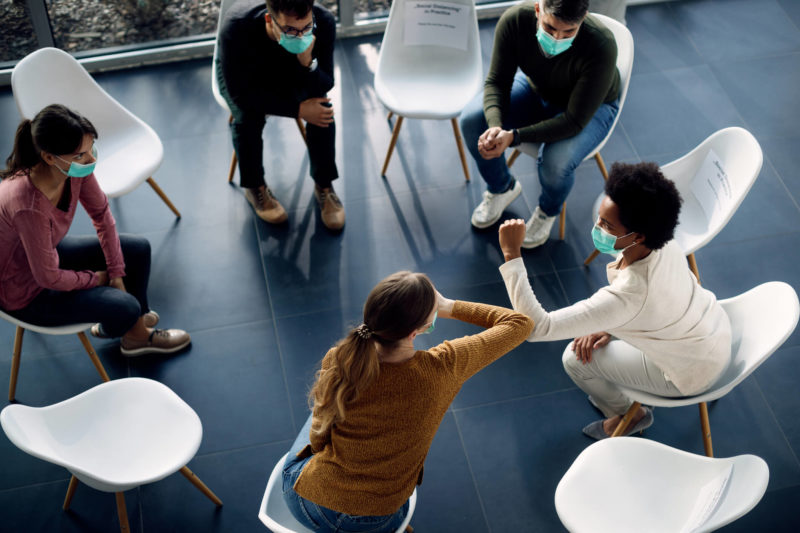
By Melissa Klass, Licensed Marriage and Family Therapist
Should You Consider Group Therapy?
You’ve read a million articles about group therapy, but you still can’t decide. Should you look for a group? What will it be like? Will it help you? Could it be harmful rather than helpful? What different types of groups are available?
Misconceptions about Group Therapy
According to Yalom (p. 295), there are three common misconceptions about group therapy: (1) that it can be unpredictable (for example, group members could exert pressure for self-disclosure), (2) that it is not as effective as individual therapy because of the reduced amount of attention each individual receives from the therapist, and (3) that spending time with individuals who suffer from emotional disturbance can be harmful. Let’s address each issue in turn.
Unpredictability?
Can group therapy be unpredictable, with all those different personalities in one room? Yes, of course. Will you ever have to disclose something that you don’t want to? No, absolutely not. Group members may exert pressure from time to time, but only you know what is best for you, and you must work at your own pace. You might want to share some dark or uncomfortable experience with the group. Or you might not. The choice is yours.
Effectiveness?
Is group therapy less effective because healing is directly correlated to the amount of time the therapist spends on you and your individual needs? No, it’s not less effective, but it does bring about healing in a different way. The therapist’s role is to gently guide the members, but much of the healing happens in the “here and now” of the therapy group—that is to say, due to the exchanges with and insights of other group members. You will most certainly receive individual attention in your group, but that is not the only factor in achieving growth.
Unhelpful Influence?
Lastly, can spending time with others who suffer from emotional disturbance be harmful? Essentially this question posits that someone else’s neurosis will rub off on you, like the flu. When put that way, I imagine you already know the answer. (The answer is: no.)
Benefits of Group Therapy
Now that we have that out of the way… should you join a group? Maybe I’m biased, but I think so. The benefits of group therapy are numerous. For example, giving and receiving support, increasing self-awareness, improving communication skills, and (hopefully, and perhaps most importantly) realizing that you are not alone are all fruits of group therapy. Also, group sessions are cheaper! Good, solid treatment for a fraction of the price of individual therapy—you really can’t beat it.
Finding the Right Group for You
So how do you find one? If you have an individual therapist, she is a great resource; if she doesn’t run groups herself, she can likely point you in the right direction. Google is also your friend. Any site you would use to find an individual therapist will probably have lists of available groups in your area.
Types of Therapy Groups
There are several different types of groups – only you can decide which type of group therapy best suits you and your goals for therapy. Groups have guidelines to keep everyone on the same page. Issues such as confidentiality and fraternizing outside of the group will likely be addressed by the therapist and discussed as-needed on an ongoing basis. The type and format of your group will be factors that influence those guidelines.
Type
- Looking for insight into yourself and your relationships? You want a process group. Typically, these groups are longer-term and more fluid, depending on the needs of the members.
- How about parenting, anger management, stress-management, or support coping with phobias? You should consider a psychoeducational group. Often more structured and time-limited, these groups should present you with specific learning objectives over a set number of weeks.
- Recovering – or hoping to recover – from addictions? Addictions or substance abuse support groups are a powerful tool to help with that process.
Format
The format of the group is something else to consider.
- Closed groups often cap at six or eight members, and the group members will change relatively infrequently.
- Open groups allow members to come and go.
Facilitator
Lastly, meet the therapist. An initial consultation is part of the process to assess if you are a good fit for a group. The therapist will interview you to determine if she believes your needs will be met by the group, and you will interview her to see if you “click.” Yes, the spark, the connection, between two people is an essential component of any therapeutic relationship. If you don’t feel it immediately, don’t worry, sometimes it takes a while. The important question is, do you feel it could develop?
It’s okay if you have to shop around some to find the therapist and therapy group that are the right fit for you. I hope this article helps you take the first step. Good luck!
References:
Yalom, I. D., & Leszcz, M. (2005). The theory and practice of group psychotherapy. New York, NY: Basic Books.
To find a therapist who facilitates groups, click here to search your area and then filter by Type of Service -> Group Therapy. You can also search our workshop directory for groups, retreats, and seminars.
© Copyright 2021 GoodTherapy.org. All rights reserved. Permission to publish granted by Melissa Klass, Licensed Marriage and Family Therapist
